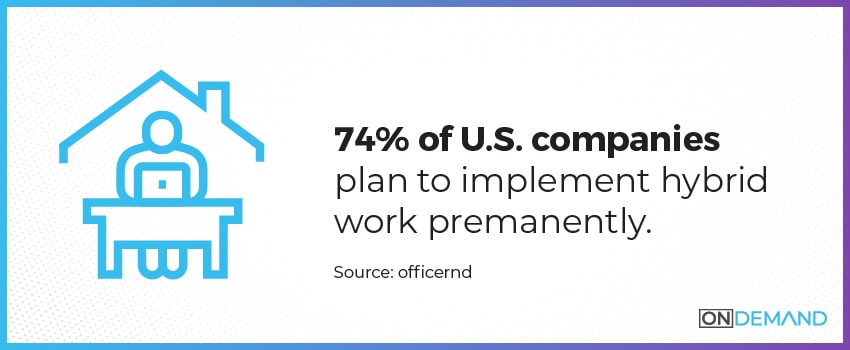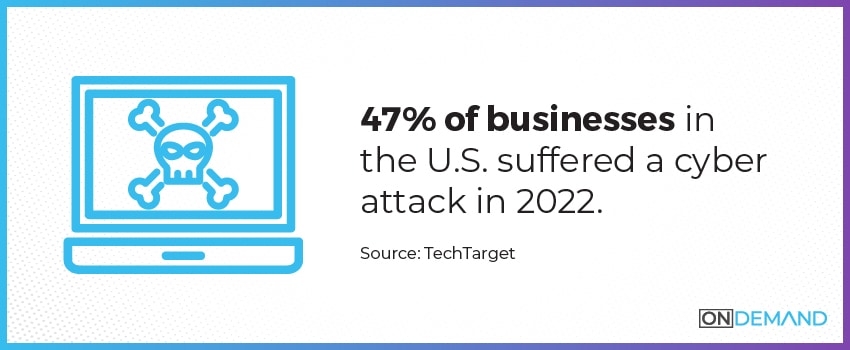Choosing the right type of internet for your business is a decision that can significantly impact your operations, productivity, and overall success. And with 74% of U.S. companies planning to implement a permanent hybrid work model,1 navigating the many types of business internet to find the best option to support your work-from-anywhere teams can be daunting.
In this blog, we’ll walk you through the different types of internet and factors you should consider to help you choose a connectivity solution that empowers your business in today’s digital landscape.
What Are the Different Types of Business Internet Connectivity?
Organizations can choose from many types of internet connections, depending on their location, budget, bandwidth requirements, and other needs. Some common types of business internet include:
Dedicated Fiber
Dedicated fiber refers to fiber optic connectivity that isn’t shared with any other user or company. The fiber cable connects directly from your service provider’s network to your premises, so your business can enjoy a private internet connection. Dedicated fiber offers exclusive access to the fiber line’s full capacity and bandwidth, which is why many enterprises or organizations that depend on data-intensive applications – such as cloud services, video streaming, or large data transfers – opt for this type of connection.
Shared Fiber
Shared fiber is when a fiber optic cable is connected to a distribution point in your company’s neighborhood or building. Traditional copper or coaxial cables are then used to connect your premises to this central point. Multiple businesses can share the same fiber connection with you, and the number of users can influence the capacity and performance of the connection. Shared fiber is most often used for small businesses that don’t require high-bandwidth applications to operate.
Cable
Cable internet uses coaxial cables to transmit data between the service provider and your building. Since this type of internet leverages the infrastructure originally used to send television signals, it’s widely available. Cable internet can deliver faster speeds compared to dial-up or DSL connections, so it’s a popular choice for small businesses that need reliable, affordable high-speed internet access.

Fixed Wireless
Fixed wireless is an internet connection that delivers high-speed internet using wireless communication technology. With fixed wireless internet, your service provider installs antenna and radio equipment on towers, rooftops, or other elevated locations to establish line-of-sight or near-line-of-sight connections between their infrastructure and your premises. It provides a cost-effective alternative to traditional wired connections, especially in rural or hard-to-reach areas where laying cables or accessing fiber is difficult.
Satellite
Satellite internet connections use communication satellites to provide high-speed internet access. This service relies on a network of satellites orbiting the Earth at a fixed position, allowing them to maintain a consistent connection with ground-based antennas affixed to your facilities. Businesses in areas where fiber or cable internet may be limited or unavailable often turn to satellite for reliable connectivity.
Cellular
Cellular internet refers to 5G and LTE connectivity, which are widely available mobile network technologies. Businesses can quickly deploy 5G and LTE internet connections in areas where wired connections are unavailable or when temporary connectivity is needed. Additionally, many companies use cellular internet as a reliable backup option if their primary connection fails.
5 Things To Consider When Choosing Business Internet
Choosing the right business internet can be tricky if you’re not sure which factors are most important for your business. Here are a few tips to keep in mind when shopping around for an internet service provider (ISP):
1. Performance
Your internet’s overall performance will depend on its speed and bandwidth, but several additional factors can impact quality. Consider the number of employees and how many need remote access, the type of online activities your workforce uses, and whether your teams will need to access applications in the cloud. Your internet service provider should not only be able to meet your business’s current performance needs, but your future needs as well.
2. Security
Around 47% of U.S.-based businesses suffered a cyber attack in 2022.2 Evaluate any potential ISP’s security measures, such as firewalls and encryption protocols, to make sure they can keep your critical data safe from cyber attacks. Depending on your business, you might consider using enhanced security features like a virtual private network (VPN) or dedicated connections to protect sensitive data.

3. High Uptime
Your ISP should have a strong track record of providing customers with high uptime. It’s no secret that downtime can result in significant productivity and financial losses, so consider your ISP’s service level agreements (SLAs) and reputation for reliability. You should also consider leveraging different types of internet connections at once for better uptime.
4. Redundancy
Reliable connectivity is critical for most businesses, especially considering that 60% of network outages cost companies $100,000.3 Ensuring your ISP offers redundancy measures, such as backup connections or failover systems, can help to ensure your workforce stays connected in case of service disruptions.
5. Customer Support
If your network goes down or your teams experience laggy connections, you want an ISP who can help resolve the issues quickly. Consider the level of customer support your ISP provides so that you can minimize downtime and ensure smooth operations, no matter what problems arise.
Does Your Business Need SD-WAN?
Researchers predict that 92% of organizations will adopt software-defined wide area networking (SD-WAN) solutions by 2026.4 If you’re not sure whether your business could benefit from SD-WAN, here are a few advantages of using this connectivity solution:
Multiple Locations – If your business has multiple locations or a hybrid workforce, SD-WAN can improve connectivity between sites.
Network Complexity – SD-WAN offers better control and visibility if your business has a complex network, such as multiple connections, diverse applications, or cloud-based services.
Improved Performance – SD-WAN can improve network performance by dynamically selecting the best path for different types of internet traffic using multiple connection types, such as MPLS, broadband, or cellular.
Cost Savings – Businesses that use SD-WAN can save money by leveraging more affordable internet connections and reducing reliance on expensive MPLS lines.
Centralized Management – SD-WAN offers a centralized management interface to simplify network monitoring, configuration, and troubleshooting.
Find the Best Internet for Your Business With OnDemand
If you’ve recently invested in cloud technologies to support your remote or hybrid teams, ensuring your new applications run as smoothly as possible is likely a top priority.
OnDemand helps businesses find the best connectivity and SD-WAN solutions to meet their unique needs. Our vendor-agnostic technology advisors will sit on your side of the table and do what’s right for your business – always. Ready to learn more about how OnDemand can help you find the right internet to grow your business? Get in touch today to request a consult.
Sources:
